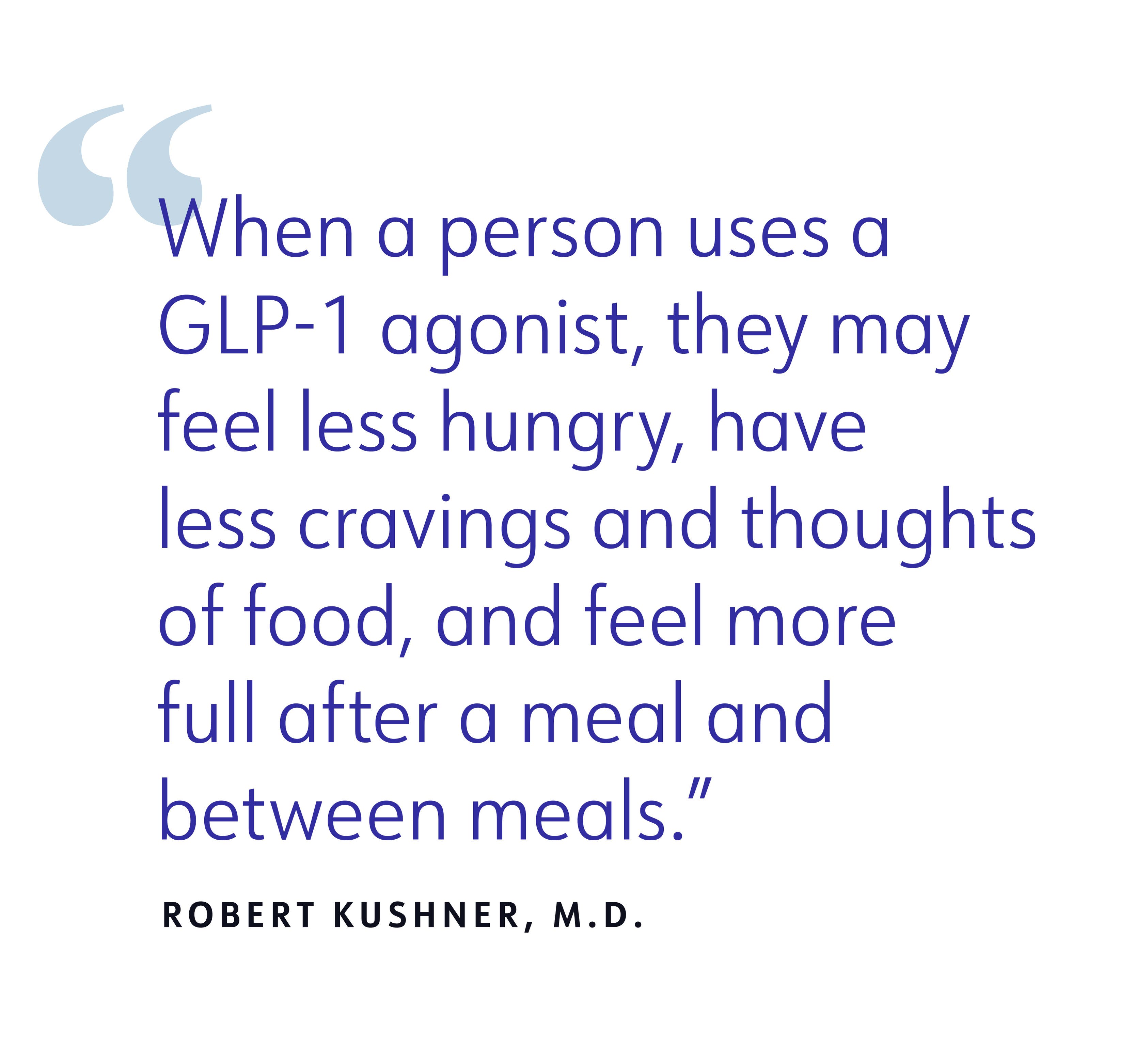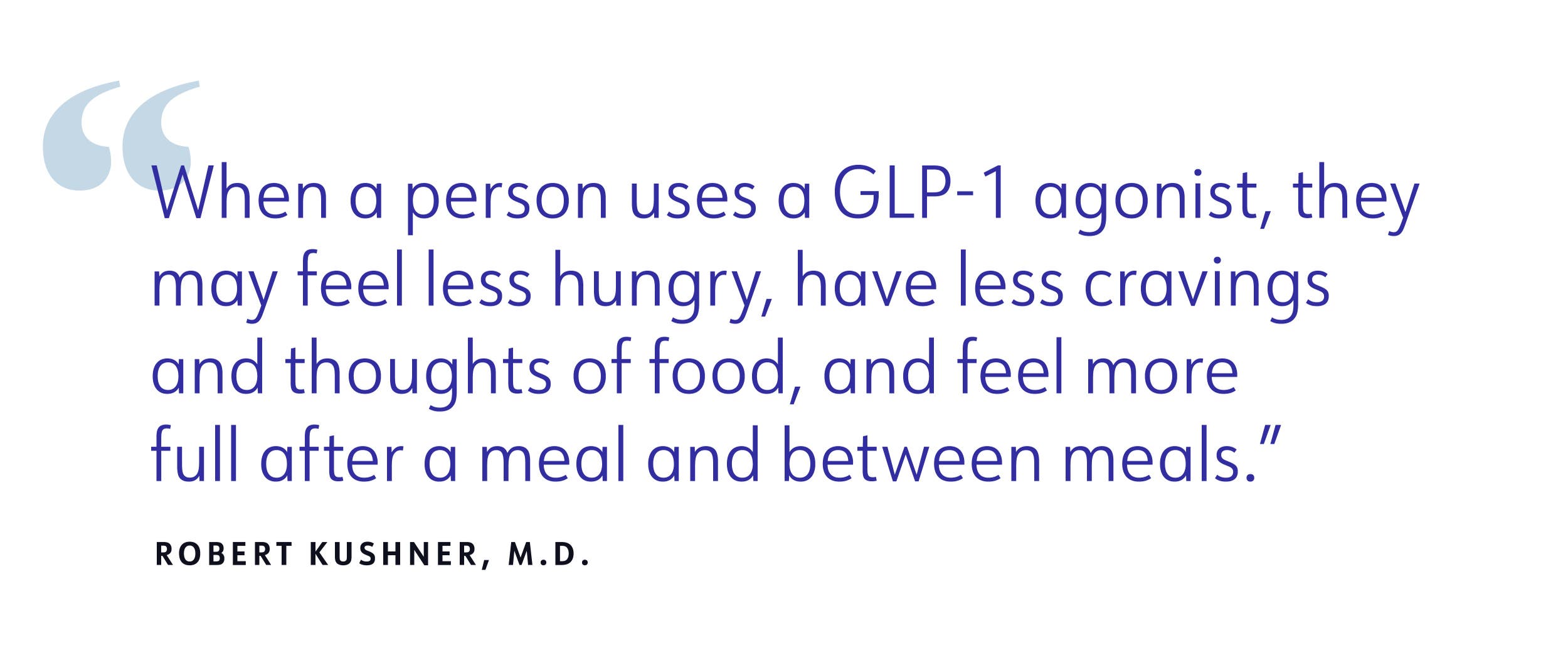GLP-1 agonists: Overview, how they work, and more


Like the plot of a 2000s teen movie, GLP-1 medications are like the main character who starts at a new school and becomes popular overnight. It may seem like the meds popped up out of nowhere, but the reality is they just…transferred. GLP-1 medications have been treating type 2 diabetes since 2005—but that certainly hasn’t stopped the internet rumor mill. To get the facts about these diabetes-turned-obesity meds, we asked experts to share how GLP-1s lead to weight loss, what side effects to keep an eye on, and how to know if your weight-loss journey could benefit from adding medication.
What is a GLP-1 agonist?
GLP-1 (which stands for glucagon-like peptide) is a gut hormone released by specialized cells in your intestinal tract after you eat. “When you consume carbohydrates, GLP-1 boosts the amount of insulin the body makes in order to bring your blood sugar back to normal,” says Dr. Robert Kushner, M.D., professor of medicine and medical education at Northwestern University Feinberg School of Medicine in Chicago. It does this in two ways: by triggering extra insulin, a hormone that helps lower blood sugar levels, and by inhibiting glucagon, a hormone that raises blood sugar levels.
While GLP-1 naturally occurs in the body, it only lasts about two to three minutes upon release. But the drug form of GLP-1, known as GLP-1 agonists, can last up to 14 hours in your body. And that means the effects last a lot longer too.


So how do GLP-1 agonists work for weight loss?
“GLP-1 agonists activate the receptors in the body that respond to GLP-1,” says Kushner. In other words, they act like the body’s GLP-1. By activating receptors in the pancreas, they’re able to regulate insulin and control blood sugar. But they also activate receptors in the brain to curb appetite and in the gut to slow stomach emptying.
That’s why, notes Kushner, “when a person uses a GLP-1 agonist, they may feel less hungry, have less cravings and thoughts of food, and feel more full after a meal and between meals.” They may also raise your resting metabolism.
Altogether, this leads to weight loss — an average of 15% to 21% body weight, per studies on semaglutide and tirzepatide (two popular GLP-1s) published in the The New England Journal of Medicine.
What are the side effects of GLP-1 agonists?
The side effects of GLP-1 agonists are most commonly gastrointestinal in nature. While the exact reasons are still unclear, research suggests that they stem from a number of factors, like how long the GLP-1 agonists act in the body, their effects on the central nervous system, and their impact on general gastrointestinal functions, like how quickly your stomach empties. As long as you are on the medication, you may experience temporary side effects. The side effects, which are likely to subside over time, may include:
Starting at low doses may help circumvent these, says Kushner, who also notes that these side effects can usually be alleviated if people eat low-fat foods, smaller portion sizes, and a balanced meal plan. Even so, “because of the known side effects, the medication is always started at a low dose and periodically escalated following a fixed schedule,” he says.
Who is an appropriate candidate for GLP-1 agonists for weight loss?
The medications aren’t designed for people who just want to lose a few pounds. For a doctor to prescribe the drugs, you need to meet certain criteria. For example, those who are candidates for Wegovy “meet the FDA requirements of having a BMI (body mass index) of 30 or more — or 27 or more with a weight-related complication, such as hypertension or [high cholesterol],” says Tom Wadden, Ph.D., a psychologist and professor at University of Pennsylvania, in Philadelphia, who studies obesity treatments. Also, those who are pregnant or nursing, planning to become pregnant, have a personal or family history of certain cancers, or have experienced angioedema, should not take GLP-1 agonists.
GLP-1s prescribed for weight management
Not all GLP-1s will help you lose weight, and not all are FDA-approved for weight management. Here are the ones to know about:
Semaglutide (Wegovy, Ozempic, Rybelsus)
Known under the brand name Wegovy, semaglutide is FDA-approved for obesity management and comes with a maximum prescribed dose of 2.4 mg. “Wegovy is inducing an average 15% reduction in baseline body weight, roughly twice as much as other earlier types of FDA-approved weight-loss medications,” says Wadden
Ozempic is the same drug but it has only been FDA-approved for treating diabetes and it comes in a lower dose (the maximum prescribed dose of Ozempic is 2.0 mg). Both are delivered via weekly injections. Observed weight loss is generally lower with Ozempic.
There is an oral semaglutide option under the brand name Rybelsus, which is approved for type 2 diabetes treatment. However, studies have shown some weight loss but not as much as Wegovy, so it’s not approved for the treatment of obesity. There are currently studies testing an oral form of semaglutide for weight management that is a higher dose and will likely be FDA approved in the future for obesity.
Liraglutide (Saxenda, Victoza)
With the brand name Saxenda, liraglutide is another GLP-1 agonist used for weight loss. A 2015 study found that pairing liraglutide with healthier eating and exercise helps improve blood sugar control, lowers blood pressure, and leads to weight loss. However, “semaglutide is over two times more effective than liraglutide in causing weight loss,” says Kushner.
When would someone be given semaglutide or tirzepatide over liraglutide? According to research published in the Journal of the American Medical Association, "Semaglutide has been associated with reductions in food cravings, which is less evident with liraglutide.” The same is observed for tirzepatide. What that may mean is that if food cravings aren’t a huge issue for you, liraglutide might be just enough.
Similar to semaglutide, there is another form of liraglutide, Victoza, that is FDA approved for managing type 2 diabetes, but not weight loss; it’s also rarely used off-label.
Tirzepatide (Zepbound, Mounjaro)
The newest GLP-1 drug, tirzepatide is taken weekly via self-injection with a maximum dose of 15 mg, and is sold under the brand name Zepbound for weight loss. Research in the New England Journal of Medicine shows that people living with obesity and without diabetes lost an average of 21% of their total body weight in just over a year with Zepbound.
Unlike the other GLP-1s, which only target the GLP-1 gut hormone, Zepbound works on a secondary gut hormone called gastric inhibitory polypeptide (GIP). By mimicking two hormones instead of one, Zepbound amplifies its effects.
Like the other GLP-1 weight-loss medications, Zepbound has a counterpart form of tirzepatide that’s FDA approved for type 2 diabetes — Mounjaro.
Other types of GLP-1 agonists
Dulaglutide is the GLP-1 agonist sold under the brand name Trulicity, and it’s solely available for controlling type 2 diabetes. “No form of dulaglutide is approved for weight management,” says Kushner, who adds that it’s rarely, if ever, prescribed for off-label use. Eventide was an injection-free GLP-1 agonist that showed promise, but ultimately didn’t get FDA approval for its application to treat type 2 diabetes.
Lifestyle change remains the foundation for all weight loss
GLP-1 agonists like Wegovy, Saxenda, and Zepbound are designed to be used for the chronic treatment of obesity, not something to be used in the short-term. For one, you can’t use them to jump-start your weight loss, and then attempt to maintain your weight on your own without making necessary lifestyle changes.
“People are likely to regain lost weight after stopping the medication, just as their blood pressure would increase if they stopped their anti-hypertensive medications,” says Kushner. “The drugs only work when they are taken.”
Whether or not you commit to a lifetime of taking a GLP-1 medication for weight loss, taking care of yourself goes far beyond a pill or injection. “It is important to follow a healthy diet and be as physically active as possible, since these are foundational treatments for weight loss and improved health,” says Kushner.
The WeightWatchers GLP-1 Companion Program helps you do just that. By helping you focus on healthy habits — exercising regularly, drinking plenty of water, and getting enough protein and fiber — it helps you mitigate side effects while maximizing health benefits as you lose weight on medication. Need more support? WeightWatchers now offers one-on-one access to healthcare providers who can prescribe and manage weight-loss medication, if you’re eligible. And, if it’s more nutrition guidance that you’re after, you can meet with a registered dietitian for as little as $0 with applicable insurance.
The bottom line
Ultimately, GLP-1 agonists are possible game changers in the field of medical weight management. In targeting the brain’s pathways, they’re able to lead to long-term, meaningful weight loss without sustained side effects for people with obesity who are willing to stay with the drug. Still, GLP-1s work best in partnership with healthy habits for weight management, like a nutritious diet, adequate sleep, stress management, and moderate physical activity.
This content is for informational purposes only and does not constitute medical advice, diagnosis or treatment. It should not be regarded as a substitute for guidance from your healthcare provider.
WeightWatchers relies on only the most trustworthy sources, including highly credentialed experts, government and academic institutions, peer-reviewed studies, and respected medical associations. We focus on primary sources and research that is recent, relevant, and high-quality. For more about how we report, write, and fact check our stories, please see our editorial policy.
FDA drug shortage: Food & Drug Administration (no date). “FDA Drug Shortages.” https://www.accessdata.fda.gov/scripts/drugshortages/default.cfm
Gastric side effects: Postgraduate Medicine (2022). “Managing the gastrointestinal side effects of GLP-1 receptor agonists in obesity: recommendations for clinical practice.” https://www.tandfonline.com/doi/full/10.1080/00325481.2021.2002616
Oral semaglutide: Frontiers in Endocrinology (2021). “Efficacy of Semaglutide in a Subcutaneous and an Oral Formulation.” https://www.frontiersin.org/articles/10.3389/fendo.2021.645617/full
Off-label prescriptions: Mayo Clinic Proceedings (2012). “Ten Common Questions (and Their Answers) About Off-label Drug Use.” https://www.ncbi.nlm.nih.gov/pmc/articles/PMC3538391/
Liraglutide for weight loss: The New England Journal of Medicine (2015). “A Randomized, Controlled Trial of 3.0 mg of Liraglutide in Weight Management.” https://www.nejm.org/doi/full/10.1056/nejmoa1411892
Eventide: Biomedicine & Pharmacotherapy (2018). “Recent updates on GLP-1 agonists: Current advancements & challenges.” https://www.sciencedirect.com/science/article/pii/S0753332218327537
Tirzepatide: The Lancet (2023). “Tirzepatide once weekly for the treatment of obesity in people with type 2 diabetes (SURMOUND-2): a double-blind, randomised, multicentre, placebo-controlled, phase 3 trial.” https://www.thelancet.com/journals/lancet/article/PIIS0140-6736(23)01200-X/fulltext
Tirzepatide for weight loss: Lilly: Investors (2022). “Lilly receives U.S. FDA Fast Track designation for tirzepatide for the treatment of adults with obesity, or overweight with weight-related comorbidities.” https://investor.lilly.com/news-releases/news-release-details/lilly-receives-us-fda-fast-track-designation-tirzepatide
GLP duration in the body: Frontiers in Endocrinology (2019). “The Discovery and Development of Liraglutide and Semaglutide.” https://www.frontiersin.org/articles/10.3389/fendo.2019.00155/full
Insulin: Centers for Disease Control and Prevention (2021). “Insulin Resistance and Diabetes.” https://www.cdc.gov/diabetes/about/insulin-resistance-type-2-diabetes.html
GLP-1 and metabolism: Frontiers in Endocrinology (2021). “GLP-1 Receptor Agonists: Beyond Their Pancreative Effects.” https://www.frontiersin.org/articles/10.3389/fendo.2021.721135/full
GLP-1 weight loss amount: The Lancet (2018). “Efficacy and safety of semaglutide compared with liraglutide and placebo for weight loss in patients with obesity: a randomised, double-blind, placebo and active controlled, dose-ranging, phase 2 trial.” https://www.thelancet.com/journals/lancet/article/PIIS0140-6736(18)31773-2/fulltext
GLP-1 and obesity: International Journal of Molecular Sciences (2019). “Glucagon, GLP-1 and Thermogenesis.” https://www.ncbi.nlm.nih.gov/pmc/articles/PMC6678955/#:~:text=L%20cells%20from%20the%20digestive,leading%20to%20augmented%20energy%20expenditure.
Semaglutide weight loss: The New England Journal of Medicine (2021). “Once-Weekly Semaglutide in Adults with Overweight or Obesity.” https://www.nejm.org/doi/full/10.1056/NEJMoa2032183
Liraglutide and weight loss: The New England Journal of Medicine (2015). “A Randomized, Controlled Trial of 3.0 mg of Liraglutide in Weight Management.” https://www.nejm.org/doi/full/10.1056/nejmoa1411892
Tirzepatide and weight loss: The New England Journal of Medicine (2022). “Tirzepatide Once Weekly for the Treatment of Obesity.” https://www.nejm.org/doi/full/10.1056/NEJMoa2206038
